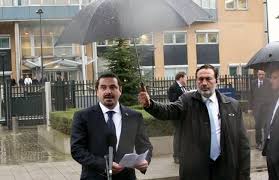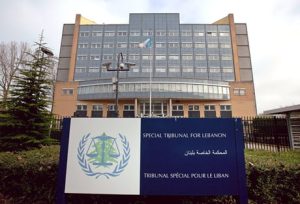
Since its inception in 2009, the Special Tribunal for Lebanon (STL) in The Hague has divided Lebanon. To date, more than half a billion USD has been spent, and the meter is still running. In recent years, the STL has made no arrests; it will probably never do so in the future, and, on top of that, the nation to which it is supposed to bring justice has completely lost interest. Maybe it is time to call it a day?
By Arthur Blok
There is no misunderstanding: the STL was created with the best intentions. From day one, it was surrounded by high expectations, but it never really delivered. It clearly illustrates how slow, complex, and ineffective international justice can be.
UNIIC & the STL
Just a few months after the 2005 assassination of the Lebanese former Prime Minister Rafiq al-Hariri - and the 22 others who died in the bomb blast in Beirut on Feb. 14, 2005 - the United Nations’ International Independent Investigation Commission (UNIIIC) made it crystal clear in the findings of their reports who was behind the horrific attack.
At that time, Hariri senior - may his soul rest in peace - and the long list of other opinion leaders and politicians were all at odds with the Syrian regime and its project in Lebanon. If anyone had an interest in silencing Hariri and his supporters, it was them, said the UNIIIC reports.
The bomb attack and the wave of political assassinations that followed gave the newborn March 14 movement a unique momentum to become the dominant political force in the country. The movement was ambitious, and its supporters had high hopes. But years of heated rhetoric towards the Syrian–Iranian influence in the country led to nothing. The delicate balance of confessional power sharing - and pressure from regional powerbrokers - forced rival movements to keep on working together and diminished the importance - and influence - of the UNIIIC and later the STL.
The findings in the more than ten reports of the UNIIIC, from those of the Irish deputy police commissioner Peter FitzGerald, to those of Detlev Mehlis, Serge Brammertz and Daniel Bellemare, clearly pointed in one direction: the Syrian regime was fed up with Hariri and other Lebanese opponents and was looking for ways with its local allies to get rid of him.
That is exactly what they did. In the years that followed, it became evident that, regardless of what emerged from UNIIIC, the political status quo in the country would remain largely unchanged.
The investigation and, later, the establishment of the STL, which were intended to bring justice and accountability, did the exact opposite. It became one of the most divisive matters in contemporary Lebanese history.
Soon after the indictment was submitted in early 2011, matters deteriorated further. The ‘unity government’ of Saad Hariri collapsed over disagreements about how to address the STL. It was to be expected that when Hussein Hassan Oneissi, Salim Jamil Ayyash, Assad Hassan Sabra, Hassan Habib Merhi and Mustafa Amine Badreddine were indicted, Lebanon would be heading towards a new political crisis.
The five men - all active members of Hezbollah - were never arrested. On top of that, Hezbollah chief Sayed Hassan Nasrallah made it clear that they would never be arrested or punished, not in 30 days, 30 years or even 300 years.
Absentia trial
As a result, the men are being tried in absentia before the court: a unicum in international law and a point of reflection for both STL critics and supporters. More than seven years after the indictment was filed, the verdict is still pending. Many, including STL experts, have lost track of what is happening in The Hague. Is the case really that complicated that it must take that long and cost so much?
News from the tribunal has disappeared from the frontpages of the countries’ leading newspapers and news sites. Most national TV stations no longer send reporters to The Hague and have stopped covering news about the tribunal. Hariri’s Future TV and newspaper are the only exceptions that prove the rule.
It is important never to forget those who died in the wave of attacks and the sacrifices the loved ones made as a result. Let us also not forget the long list of innocent bystanders who were killed in the process: individuals who were at the wrong place at the wrong time.
That said, given the current regional challenges and power balance, most Lebanese politicians and opinion leaders obviously have other concerns on their minds. Almost 15 years later, they - and the people they are expected to represent - moved on. Which is, of course, the easiest thing to do. It is not only that everyone seems to have lost interest, but it also appears that many would rather have no verdict at all, whether it be in absentia or not.
Whatever happens in The Hague in the coming months and years will have no real influence on the position of the embattled Syrian president, Bashar al-Assad. That is for sure. Nor will it have any influence on Hezbollah's position in the country.
Assad will probably survive, no matter how many witnesses declare he was involved or not. The same goes for Hezbollah; if their men are found guilty in absentia, nothing will really change, not even if the Defence teams appeal in absentia on their behalf.
It is inevitable that Saad Hariri, who was recently designated to serve a third term as prime minister, will have to engage with both entities in his capacity as Lebanon's prime minister. Forgive and forget seems to be his motto. In practice: in his blind urge to stay in power, he already did a long time ago, and it looks like he does not care anymore who killed his father.

Money well spent?
What about the price tag of more than half a billion USD spent by the UNIIIC and the STL, of which the Lebanese state bears half? With an annual budget exceeding USD 50 million, the end is not yet in sight. Is it money well spent, or would it have been better to invest it in Lebanese state institutions in the past 15 years?
In contrast, the annual budget of the Lebanese Ministry of Justice increased over the past decade to approximately USD 80 million. For the sake of the nation, it may have been better to allocate the entire STL budget to the Lebanese judiciary or to other underfunded state institutions.
Soon, the investigation and ongoing trial will celebrate its third lustrum. For many, developments at the STL are increasingly taking place in the background. Because of the STL, the term ‘justice’ got a whole new meaning in Lebanon. While the end of this very special tribunal is not even in sight, the meter keeps on running. It does not look like this is going to change anytime soon.






Could not agree more. Well said and written Mr Blok! It is about time someone raises these questions. Enough is enough..